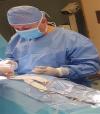Suggest Treatment For Blepharospasm

Neurological evaluation is needed.
Detailed Answer:
Hi, I had gone through your question and understand your concerns.
Adulthood onset facial movements mostly are known as Blepharospasm.
More information is needed about your symptoms and medical history in order to narrow diagnosis possibilities.
Blepharospasm could be primary ( not related to other diseases or conditions), or secondary ( associated with other diseases and conditions).
Last ones include
1.neurodegenative disorders (Parkinsonism, basal ganglia degeneration etc)
2. Inherited
3. Associated with metabolic disorders.
So in my opinion there is need to consult a Neurologist and discuss above mentioned possibilities.
Hope this answers your question. If you have additional questions or follow up questions then please do not hesitate in writing to us. I will be happy to answer your questions.
Answered by

Get personalised answers from verified doctor in minutes across 80+ specialties



